Bibliography
- Eileen Denza, Diplomatic Law: Commentary on the Vienna Convention on Diplomatic Relations (Oxford: Oxford University Press, 1998).
| Roles |
| ||||||||||||||||
|---|---|---|---|---|---|---|---|---|---|---|---|---|---|---|---|---|---|
| Offices | |||||||||||||||||
| Types | |||||||||||||||||
| Topics | |||||||||||||||||
| Documents | |||||||||||||||||
| Other topics | |||||||||||||||||
Diplomatic law is that area of international law that governs permanent and temporary diplomatic missions. A fundamental concept of diplomatic law is that of diplomatic immunity, which derives from state immunity.
Key elements of diplomatic law are the immunity of diplomatic staff, the inviolability of the diplomatic mission and its grounds, and the security of diplomatic correspondence and diplomatic bags. Famous cases involving the breaking of diplomatic laws includes the Iran hostage crisis in 1979, the shooting of a British police woman (Murder of Yvonne Fletcher) from the Libyan Embassy in London in 1984, and the discovery of a former Nigerian Minister in a diplomatic crate at Stansted airport [1] in 1984.
It is also an accepted principle of customary international law and is recognised between countries as a matter of practicality. Diplomatic law is often strictly adhered to by states because it works on reciprocity. For example, if a country expels diplomats from another country, then its diplomats would most likely be expelled from the other country.
For most of history diplomatic law has mostly been customary. However, early codifications of diplomatic law include the British Diplomatic Privileges Act 1708. An important treaty with regards to diplomatic law is the 1961 Vienna Convention on Diplomatic Relations. Questions not expressly regulated by the Convention continue to be governed by the rules of customary international law.
The most fundamental rule of diplomatic law is that the person of a diplomatic agent is inviolable. [2] Diplomats may not be detained or arrested, and enjoy complete immunity from criminal prosecution in the receiving state, although there is no immunity from the jurisdiction of the sending state. [3]
The only remedy the host state has in the face of offences alleged to have been committed by a diplomat is to declare him or her persona non grata , which typically means that the diplomat must leave the territory of the state. In 1999, for example, an attaché of the Russian Embassy in Washington DC was declared persona non grata for suspected "bugging" of the State Department.
The UN Convention on the Prevention and Punishment of Crimes against Internationally Protected Persons, Including Diplomatic Agents was adopted in 1973. It provides that states parties must make attacks upon diplomats a crime in internal law, and obliges them to extradite or prosecute offenders. However, in exceptional cases, a diplomat may be arrested or detained on the basis of self-defence or in the interests of protecting human life.
The private residence, papers, correspondence and property of diplomats are also inviolable. [4] In general, diplomats are immune from civil and administrative jurisdiction of the state in which they are serving, although there are a number of important exceptions.
Although it is unusual, the sending state may expressly waive the immunity from jurisdiction of diplomatic agents and others possessing immunity.
It is an absolute rule that the premises of the mission are inviolable and agents of the receiving state cannot enter them without the consent of the mission. [5] [6]
The receiving state is under a special duty to protect the mission premises from intrusion or damage or "impairment of its dignity". By the same token, the premises of a mission must not be used in a way which is incompatible with the functions of the mission. [7]
The receiving state is required to permit and protect free communication on behalf of the mission for all official purposes. Such official communication is inviolable and may include the use of diplomatic couriers and messages in code and in cipher, although the consent of the receiving state is required for a wireless transmitter.
There is no right under international law to diplomatic relations, and they exist by virtue of mutual consent. [8] The sending state must ensure that the consent of the receiving state has been given for its proposed head of mission. [9] Similarly, the receiving state may at any time declare any member of the diplomatic mission persona non grata and thus obtain the removal of that person. [10]
A right of diplomatic asylum is not universally established in international law. The International Court of Justice has emphasised that in the absence of treaty or customary rules to the contrary, a decision by a mission to grant asylum involves a derogation from the sovereignty of the receiving state. The Organization of American States agreed a convention in 1954. [11]
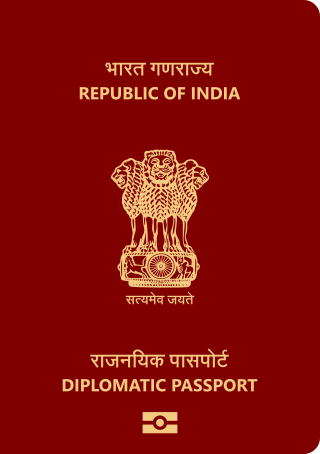
Diplomatic immunity is a principle of international law by which certain foreign government officials are recognized as having legal immunity from the jurisdiction of another country. It allows diplomats safe passage and freedom of travel in a host country and affords almost total protection from local lawsuits and prosecution.

A diplomatic mission or foreign mission is a group of people from a state or organization present in another state to represent the sending state or organization officially in the receiving or host state. In practice, the phrase usually denotes an embassy or high commission, which is the main office of a country's diplomatic representatives to another country; it is usually, but not necessarily, based in the receiving state's capital city. Consulates, on the other hand, are smaller diplomatic missions that are normally located in major cities of the receiving state. As well as being a diplomatic mission to the country in which it is situated, an embassy may also be a nonresident permanent mission to one or more other countries.
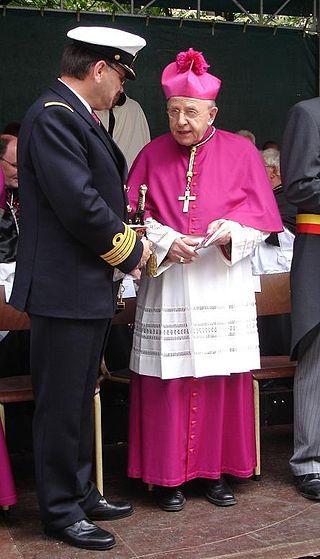
An apostolic nuncio is an ecclesiastical diplomat, serving as an envoy or a permanent diplomatic representative of the Holy See to a state or to an international organization. A nuncio is appointed by and represents the Holy See, and is the head of the diplomatic mission, called an apostolic nunciature, which is the equivalent of an embassy. The Holy See is legally distinct from the Vatican City or the Catholic Church. In modern times, a nuncio is usually an archbishop.

The Vienna Convention on Diplomatic Relations of 1961 is an international treaty that defines a framework for diplomatic relations between independent countries. Its aim is to facilitate "the development of friendly relations" among governments through a uniform set of practices and principles; most notably, it codifies the longstanding custom of diplomatic immunity, in which diplomatic missions are granted privileges that enable diplomats to perform their functions without fear of coercion or harassment by the host country. The Vienna Convention is a cornerstone of modern international relations and international law and is almost universally ratified and observed; it is considered one of the most successful legal instruments drafted under the United Nations.

An ambassador is an official envoy, especially a high-ranking diplomat who represents a state and is usually accredited to another sovereign state or to an international organization as the resident representative of their own government or sovereign or appointed for a special and often temporary diplomatic assignment. The word is also used informally for people who are known, without national appointment, to represent certain professions, activities, and fields of endeavor, such as sales.

A diplomat is a person appointed by a state, intergovernmental, or nongovernmental institution to conduct diplomacy with one or more other states or international organizations.
In diplomacy, a persona non grata (PNG) is a foreign diplomat who is asked by the host country to be recalled to their home country. If the person is not recalled as requested, the host state may refuse to recognize the person concerned as a member of the diplomatic mission. A host country may declare persona non grata status for any member of a diplomatic staff at any time without any explanation.
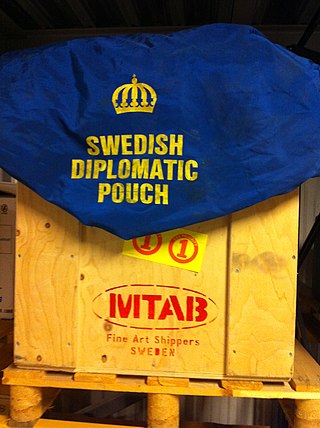
A diplomatic bag, also known as a diplomatic pouch, is a container with certain legal protections used for carrying official correspondence or other items between a diplomatic mission and its home government or other diplomatic, consular, or otherwise official entity. The physical concept of a "diplomatic bag" is flexible and it can take many forms.
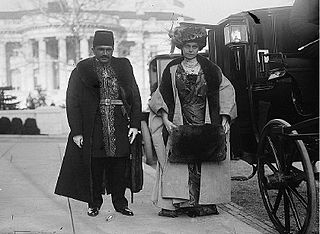
A chargé d'affaires, plural chargés d'affaires, often shortened to chargé (French) and sometimes in colloquial English to charge-D, is a diplomat who serves as an embassy's chief of mission in the absence of the ambassador. The term is French for "person charged with business", meaning they are responsible for the duties of an ambassador. Chargé is masculine in gender; the feminine form is chargée d'affaires.
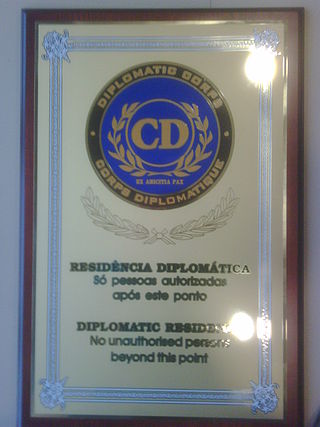
The diplomatic corps is the collective body of foreign diplomats accredited to a particular country or body.
Agrément, in international affairs, is the agreement by a state to receive members of a diplomatic mission from a foreign country.

The Vienna Convention on Consular Relations is an international treaty that defines a framework for consular relations between sovereign states. It codifies many consular practices that originated from state custom and various bilateral agreements between states.
Municipal law is the national, domestic, or internal law of a sovereign state and is defined in opposition to international law. It encompasses the laws enacted by national, state, or local governments and is concerned with regulating the behavior of individuals, corporations, and entities within the country. Municipal law includes various branches such as criminal law, private law, administrative law, and constitutional law. It is enforced by domestic courts and administrative bodies.

A consul is an official representative of a government who resides in a foreign country to assist and protect citizens of the consul's country, and to promote and facilitate commercial and diplomatic relations between the two countries.

Immunity from prosecution is a doctrine of international law that allows an accused to avoid prosecution for criminal offences. Immunities are of two types. The first is functional immunity, or immunity ratione materiae. This is an immunity granted to people who perform certain functions of state. The second is personal immunity, or immunity ratione personae. This is an immunity granted to certain officials because of the office they hold, rather than in relation to the act they have committed.

A consulate is the office of a consul. A type of diplomatic mission, it is usually subordinate to the state's main representation in the capital of that foreign country, usually an embassy. The term "consulate" may refer not only to the office of a consul, but also to the building occupied by the consul and the consul's staff. The consulate may share premises with the embassy itself.

The Ministry of Foreign Affairs, abbreviated KLN, is a ministry of the Government of Malaysia that is responsible for foreign affairs, Malaysian diaspora, foreigners in Malaysia, diplomacy, foreign relations, counter terrorism, bilateral affairs, multilateral affairs, ASEAN, international protocol, consular services, maritime affairs, and chemical weapons. It is currently based in Putrajaya. It is also widely known as Wisma Putra, which is also the name of its building in Putrajaya.
The Dikko affair was a joint Nigerian-Israeli attempt to kidnap Umaru Dikko, a former Nigerian government minister living in the United Kingdom, in 1984, and secretly transport him back to Nigeria in a diplomatic bag. The kidnapping took place, but the transportation thereof was unsuccessful. After it was foiled, the political fallout seriously damaged relations between Nigeria and the United Kingdom for years.

A chancery is the principal office that houses a diplomatic mission or an embassy. This often includes the associated building and the site. The building can house one or several different nations' missions. The term derives from chancery or chancellery, the office of a chancellor. Some nations title the head of foreign affairs a chancellor, and 'chancery' eventually became a common referent to the main building of an embassy.

On 5 April 2024, the Mexican embassy in Quito was raided by Ecuadorian police and military forces. Mexico and numerous other countries decried the raid as a violation of the 1961 Vienna Convention on Diplomatic Relations and the 1954 Caracas Convention on Diplomatic Asylum.